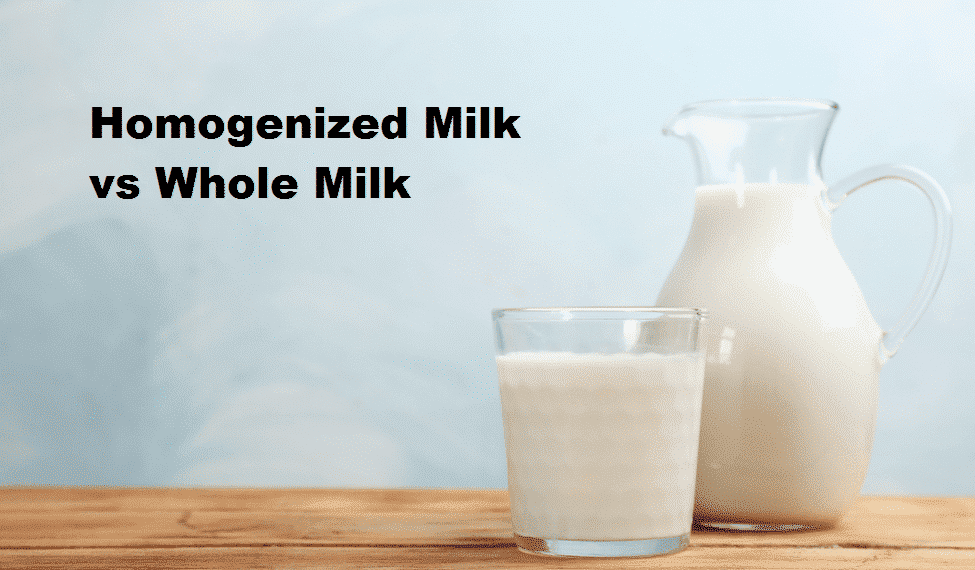
Whether it is a newborn or a dotage person, milk is crucial for everyone. It provides your body with calcium that allows you to stay healthy and fit.
But, there are a few considerations about which type of milk is better for us in today’s world. Some may say that homogenized milk is the perfect solution, and others may go for whole milk. But, no one provides an ultimate solution. We will provide a detailed knowledge about which type of milk will be better for you for our reader’s ease.
Homogenized Milk vs Whole Milk
Homogenized Milk
In simple words, in homogenized milk, the fat is reduced to a level that you will not get the cream layer you usually see while drinking hot milk. The cream is usually made up of fats, and while processing the milk, the food companies reduce those fats to avoid extra cream on the top of the glass or the milk bottle.
If you are considered about the nutrition that the milk provides, then both homogenized and whole milk does not affect milk nutrition. During the processing of milk processing of homogenized milk, food is not compromised; they remain the same in milk types. What varies in the homogenized and the whole milk is the amount of fat.
Process of Homogenizing the milk
While homogenizing the milk, the milk is passed through very tiny holes under very high temperature that helps break the fat into small particles and distribute it evenly in the milk.
Advantages of Homogenized Milk
There are quite a few benefits of homogenized milk. First of all, the homogenization helps to stay the milk fresh for an extended period. Homogenizing improves the taste and color of the milk. Along with it, homogenized milk is perfect for making desserts.
Is homogenized Milk Bad for Your Health
There is an intense debate on either the homogenized milk is good or bad for you. The simple answer to this question is that homogenized milk is very hazardous to your health. The reason for this is that during homogenization, the fat is broken down into small particles.
So, it becomes hard to digest these small particles, and they eventually remain in the stomach following the absorption in blood vessels, which is quite dangerous. Some studies have also concluded that using homogenized milk regularly may result in cancer and heart issues.
Whole Milk
Whole milk or we can say milk is the purest form of milk that is not adulterated. The whole milk is neither processed nor contains any extra ingredients other than the natural component of milk. The whole milk is rich in nutrients and consists of 87% of water.
In whole milk, you will find Vitamins, proteins, lactose, and casein protein. People usually prefer whole milk over the homogenized milk as it comes up in its purest form. Along with it, the whole milk has numerous health benefits that will attract you to go for whole milk instead of homogenized milk.
Benefits of Whole Milk
Whole milk is the perfect package to get Vitamin B, Vitamin D, Calcium, and a high number of proteins. Whole milk also prevents bone fracture, and the unadulterated calcium and fats help you boost your growth. It is also proved that whole milk is good for metabolism in your body.
People may argue that saturated fat in whole milk may cause heart-related disease, but no such research. Lastly, whole milk is considered as a source to avoid metabolic syndrome.
Disadvantages of Whole Milk
There are hardly a few disadvantages of whole milk, and none of them is as severe as the disadvantages of homogenized milk. The very first disadvantage of whole milk is that it does not remain fresh for so long. Moreover, the FDA has said that it may cause foodborne diseases.
Final Remarks
Looking at the advantages and disadvantages of both whole milk and homogenized milk, no sane person will refer you to drink homogenized milk regularly. Though you can have homogenized milk for cooking purposes, if you are going to drink it directly, whole milk is the perfect solution.
Conclusion
In the above article, we have provided detailed knowledge about the difference, advantages, and disadvantages of whole milk. The article has covered every aspect that you need to know before choosing between whole and homogenized milk. If you still need some clarification, then leave a comment below.